
Aladdin and the King of Thieves is a 1996 American direct-to-video animated musical fantasy adventure film produced by Walt Disney Television Animation. It is the second sequel to Disney's 1992 animated feature film Aladdin, and serves as the final chapter and installment of the Arabian Nights-inspired Disney franchise beginning with the first film, and continuing with its first direct-to-video sequel The Return of Jafar and the animated television series.

"Ali Baba and the Forty Thieves" is a folk tale in Arabic added to the One Thousand and One Nights in the 18th century by its French translator Antoine Galland, who heard it from Syrian storyteller Hanna Diyab. As one of the most popular Arabian Nights tales, it has been widely retold and performed in many media across the world, especially for children.
Anagnorisis is a moment in a play or other work when a character makes a critical discovery. Anagnorisis originally meant recognition in its Greek context, not only of a person but also of what that person stood for. Anagnorisis was the hero's sudden awareness of a real situation, the realisation of things as they stood, and finally, the hero's insight into a relationship with an often antagonistic character in Aristotelian tragedy.

Arabian Nights is a two-part 2000 American/British miniseries, adapted by Peter Barnes from Sir Richard Francis Burton's translation of the medieval epic One Thousand and One Nights. Mili Avital and Dougray Scott star as Scheherazade and Shahryar respectively. Produced by Dyson Lovell and directed by Steve Barron, the serial was produced by Hallmark Entertainment and originally broadcast over two nights on 30 April and 1 May 2000 on BBC One in the United Kingdom and ABC in the United States.

Chu Chin Chow is a musical comedy written, produced and directed by Oscar Asche, with music by Frederic Norton, based on the story of Ali Baba and the 40 Thieves. The piece premièred at His Majesty's Theatre in London on 3 August 1916 and ran for five years and a total of 2,238 performances, a record that stood for nearly forty years until Salad Days. The show's first American production in New York, with additional lyrics by Arthur Anderson, played for 208 performances in 1917–1918, starring Tyrone Power. It subsequently had successful seasons elsewhere in America and Australia, including in 1919, 1920, 1921 and 1922.

Ali Baba and the Forty Thieves is a 1944 adventure film from Universal Pictures, directed by Arthur Lubin, and starring Maria Montez, Jon Hall, and Turhan Bey. The film is derived from The Book of One Thousand and One Nights, but its storyline departs greatly from the tale of the same name and includes an actual historic event. The film is one of series of "exotic" tales released by Universal during the Second World War; others include Cobra Woman, Arabian Nights, and White Savage.

The Forty Thieves is a "Pantomime Burlesque" written by Robert Reece, W. S. Gilbert, F. C. Burnand and Henry J. Byron, created in 1878 as a charity benefit, produced by the Beefsteak Club of London. The Beefsteak Club still meets in Irving Street, London. It was founded by actor John Lawrence Toole and others in 1876, in rooms above the Folly Theatre, King William IV Street. It became an essential after theatre club for the bohemian theatre set, such as Henry Irving, Toole, John Hare, W. H. Kendal, F. C. Burnand, Henry Labouchère, W. S. Gilbert and two hundred of their peers. It soon moved to Green Street. The Club occasionally performed amateur plays for their own amusement and to raise funds for charities.
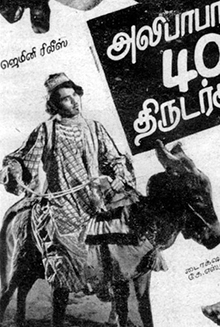
Alibabavum 40 Thirudargalum is a 1941 Indian Tamil-language comedy film directed by K. S. Mani. The first Tamil film adaptation of the story Ali Baba and the Forty Thieves, it stars N. S. Krishnan and T. A. Mathuram. The film was released on 15 March 1941, and was commercially unsuccessful. No print is known to survive, making it a lost film.

Ali-Baba is an opéra comique in three acts, first produced in 1887, with music by Charles Lecocq. The French libretto based on the familiar tale from the Arabian Nights was by Albert Vanloo and William Busnach. After some initial success the work faded from the repertoire.
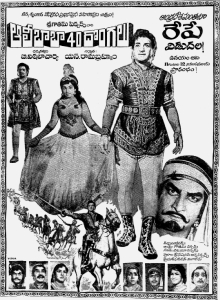
Ali Baba 40 Dongalu is a 1970 Telugu-language fantasy swashbuckler film directed by B. Vittalacharya. It stars N. T. Rama Rao and Jayalalithaa, with music composed by Ghantasala. The film is produced by N. Ramabrahmam under the Sri Gowtham Pictures banner. The film is based on a story from Arabian Nights called Ali Baba and the Forty Thieves.
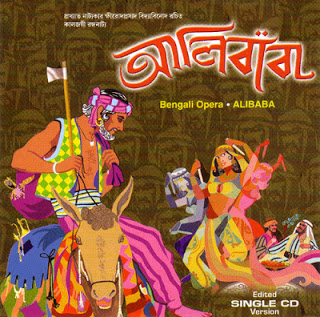
Ali Baba is a 1973 Bengali short animated film directed by Rohit Mohra. It is a musical drama about the character Ali Baba from the folk tale Ali Baba and the Forty Thieves who discovers the secret of a thieves' den, to the ire of the thieves. Ali Baba is a poor woodcutter who discovers the secret of a thieves' den, entered with the phrase "Open Sesame". The thieves learn of Ali Baba's discovery and try to kill Ali Baba, but Ali Baba's faithful slave-girl foils their plots. Ali Baba gives his son to her in marriage and keeps the secret of the treasure.

The Sword of Ali Baba is a 1965 American adventure film from Universal Pictures, directed by Virgil W. Vogel and written by Edmund Hartmann and Oscar Brodney. The film stars Peter Mann, Jocelyn Lane, Frank McGrath, Gavin MacLeod, Frank Puglia, and Peter Whitney and is a remake of the 1944 film Ali Baba and the Forty Thives, which was derived from The Book of One Thousand and One Nights and the tale of the same name.

Ali Baba and the Forty Thieves is a 1954 French comedy film directed by Jacques Becker and starring Fernandel, Samia Gamal and Dieter Borsche. It was made at the Billancourt Studios in Paris. The film's sets were designed by Georges Wakhévitch. Some scenes were shot on location in French Morocco.

Kahramana is a fountain located in Baghdad's Sa'adoon Street depicting a scene from the legend of Ali Baba and the Forty Thieves; a story taken from One Thousand and One Nights in which the slave girl Marjana outwitted the thieves by tricking them into hiding inside jars over which she poured hot oil. The statue was officially opened in 1971 and was the work of the Iraqi sculptor, Mohammed Ghani Hikmat. It has become one of Baghdad's most iconic public artworks. In the aftermath of the US-led invasion of 2003, the work assumed new meanings for the Iraqi people.
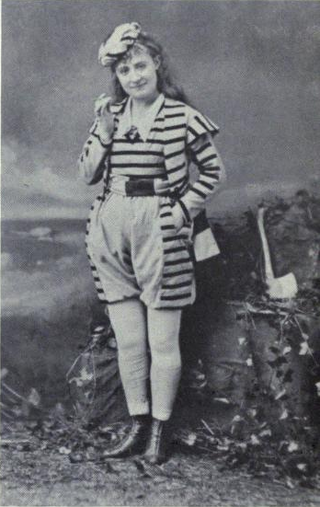
The Forty Thieves, subtitled Striking Oil in Family Jars, is an 1869 Victorian burlesque that Lydia Thompson's company debuted at Niblo's Garden in New York City on February 1, 1869. It ran for 136 performances.
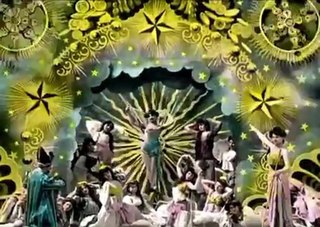
Ali Baba et les quarante voleurs(English: Ali Baba and the Forty Thieves) is a 1902 French short silent film directed by Ferdinand Zecca, inspired by the eponymous folk tale added to the One Thousand and One Nights in the 18th century by its French translator Antoine Galland, who heard it from the Maronite storyteller Hanna Diyab. It is the first cinematographic adaptation of this tale.















